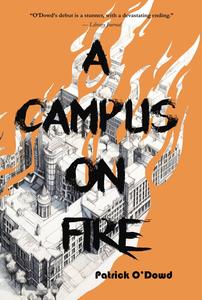
|
|
| photo: Devon Warren | |
Patrick O'Dowd's debut novel is A Campus on Fire (Regal House, April 29), a literary thriller about a student journalist investigating a shocking death within an elite university's cult-like creative writing program. As a right-wing student movement gains momentum, she finds herself dangerously entangled in the chaos. O'Dowd lives in New Jersey, where he spends too much time watching movies.
Handsell readers your book in 25 words or less:
A student journalist investigates a shocking death in an elite writing program, uncovering cult-like secrets as a rising far-right movement threatens to consume the campus.
On your nightstand now:
Daddy by Emma Cline. Her stories are razor-sharp dissections of power, desire, and quiet menace. Her novels The Girls and The Guest are two of my favorites as well.
Before the Storm by Rick Perlstein. A fascinating look at the rise of the modern right, which is especially relevant to the world of A Campus on Fire. I read this while writing A Campus on Fire, and it seemed like a good time to revisit it.
Favorite book when you were a child:
The Adventures of Sherlock Holmes by Arthur Conan Doyle. The mysteries, the atmosphere, the sheer brilliance of Holmes--it was impossible not to get hooked. I still love mysteries, and my writing often reflects that love. I think it all traces back to those stories.
Your top five authors:
Ernest Hemingway: no one distills the raw, brutal truths of the human experience with such sparse elegance.
Hilary Mantel: a genius at bringing history to life with psychological depth.
Joan Didion: her clarity of thought and precision in language is unmatched.
Patricia Highsmith: the queen of psychological unease and moral ambiguity.
Kazuo Ishiguro: the quiet devastation of his novels is masterful.
Book you've faked reading:
Gravity's Rainbow by Thomas Pynchon. I really, really want to, but I just can't crack it.
 Book you're an evangelist for:
Book you're an evangelist for:
Everybody Knows by Jordan Harper. A brutal, poetic neo-noir that strips the Hollywood mythos down to its bones. It's dark, sharp, and impossible to shake--exactly what noir should be.
Book you've bought for the cover:
Severance by Ling Ma. The eerie pink cover pulled me in, equal parts sleek and unsettling. It turned out to be an incredible mix of satire and dystopia--sharp, haunting, and oddly funny in the way it captures the slow, surreal collapse of normal life.
Book you hid from your parents:
Fear and Loathing in Las Vegas by Hunter S. Thompson. I was too young, but its chaos and madness felt like a forbidden peek into a wild, untamed world.
Book that changed your life:
Postwar by Tony Judt. It shaped the way I think about history, narrative, and the long shadows of ideology. Judt doesn't just recount events--he dissects them, showing how ideas ripple through generations. It made me see history as something alive, constantly shaping and reshaping the world we live in.
Favorite line from a book:
"The past is never dead. It's not even past." --from Requiem for a Nun by William Faulkner. It's a line that echoes through everything I write.
Five books you'll never part with:
White Noise by Don DeLillo. I first read it at a time when I felt overwhelmed by the noise of modern life, and it resonated in a way I didn't expect. DeLillo just gets it.
The Talented Mr. Ripley by Patricia Highsmith. I find Tom Ripley endlessly fascinating--his cold calculation and the moral gray areas he navigates stick with me long after the book ends.
Wolf Hall by Hilary Mantel. This book was a revelation for me. The way Mantel brings history to life with such psychological depth made me fall in love with storytelling all over again.
The Road by Cormac McCarthy. There's something about McCarthy's sparse, poetic style that sticks with you. It's grim, yet somehow hopeful, and I've never read anything quite like it.
The Collected Stories of Lydia Davis. Davis's writing is deceptively simple, but each story feels like a glimpse into something vast. I love how she makes the ordinary seem profound.
Book you most want to read again for the first time:
Never Let Me Go by Kazuo Ishiguro. The slow, creeping revelation of its world was devastating in a way I'll never forget. I'd love to experience that quiet heartbreak all over again, not knowing what was coming.
If you could have dinner with any fictional character, who would it be?
Tom Ripley. I think he'd be fascinating to sit across from. It's hard to say if he'd be charming or unsettling, but either way, it would be an unforgettable evening. I'd make sure to check my wallet, though, before I left.

